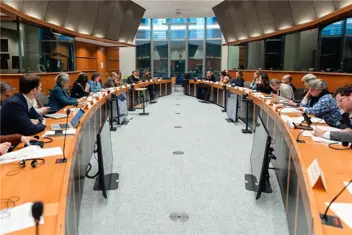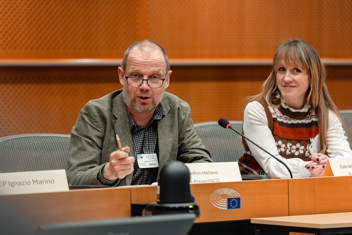Non-communicable diseases (NCDs) remain one of the greatest public health challenges in Europe. It causes 80% of deaths in the EU and take up to 10% of the GDP spent on healthcare, yet only 3% of health budgets go to prevention, even though prevention could reduce the burden by up to 70%.
In February, the Members of the European Parliament (MEP) Interest Group on Health Inequalities, Prevention and Risk Factors was launched. This marks a significant step forward in addressing the NCD challenges and advancing evidence-based policy measures to tackle the disease burden.
The event was well attended by MEPs, representatives from Member States, the World Health Organization (WHO), and civil society. JA PreventNCD was represented by leader of Work Package on Regulation and Taxation, Arnfinn Helleve from the Norwegian Institute of Public Health (NIPH) and co-leader of Work Package on Sustainability, Gabrielle Schittecatte from Sciencano, Belgium.
The interest group is led by a dedicated team of MEP Co-Chairs:
• Vytenis Andriukaitis (S&D)
• Manuela Ripa (EPP)
• Vlad Voiculescu (Renew)
• Ignazio Marino (Greens/EFA)
• Aurelijus Veryga (ECR)
• Ondřej Dostál (Non-attached)
The JA PreventNCD project recognizes the critical role of political commitment in driving policy change. As Arnfinn Helleve, emphasizes: "Engaging with policy decision-makers at both the EU and Member State levels is essential for the success of the JA PreventNCD project. The newly established MEP interest group will be a key ally in our efforts. We hope to serve as a bridge between parliamentary groups and Member States to drive impactful policy change in NCD prevention."
This initiative arrives at a crucial time when many public health policies face strong opposition from well-organized commercial interest groups. Industries with vested interests often lobby against regulatory measures designed to reduce alcohol and tobacco consumption, improve nutrition, and promote healthier lifestyles. Helleve underscores this concern: "There are many strong interest groups actively lobbying against policy initiatives aimed at preventing NCDs. Initiatives like the new MEP Interest Group are crucial to ensuring that public health policy discussions are protected from interference from commercial interests."

Civil society also play a pivotal role in shaping the future of NCD prevention. By working alongside Eurocare, EuroHealthNet, and partners in the FILTERED action grant project, JA PreventNCD has strengthened its position in European policy discussions. Gabrielle Schittecatte highlights the importance of this collaboration: "The new MEP interest group, along with the support of the civil society organizations involved, provides a forum to strengthen knowledge translation and ensure the science-to-policy gap is as small as possible. As such, the interest group can support JA PreventNCD in its sustainability endeavors, following the uptake and implementation of policy and practice recommendations from the JA."
The interest group is committed to influencing policies that shape health outcomes, particularly by addressing the main NCD risk factors. To achieve this, the leadership—supported by the secretariat— will work closely with Member States, the Presidencies of the Council of the EU, the European Commission, other MEP intergroups and interest groups, the WHO, the Joint Action Prevent NCDs, civil society organisations, and other key stakeholders.
A draft declaration, currently being refined to incorporate feedback from the launch event, outlines key priorities for the group's work. These include:
-
Securing continued funding for health, with a strong focus on prevention and risk factors, including in the next Multiannual Financial Framework (MFF), as well as sustained support for NGOs working on public health.
-
Strengthening legislative commitments to integrate health considerations into all policy areas, such as agriculture and food policy, education, workforce resilience, and security.
-
Enhancing conflict-of-interest monitoring to prevent undue commercial influence on health policies.
The establishment of the MEP Interest Group marks a promising opportunity to drive forward policy changes that prioritize public health over commercial interests. JA PreventNCD looks forward to engaging with this group to advocate for stronger, evidence-based prevention strategies that will ultimately reduce the burden of NCDs across Europe.
Stay tuned for more updates.
